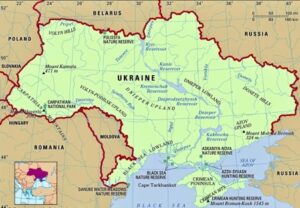It is interesting to understand a bit about Ukraine. So, I collected this during the week:
Background data: How the nation of Ukraine ranks:
1st) in Europe in proven recoverable reserves of uranium ores;
2nd) place in Europe and 10th place in the world in terms of titanium ore reserves;
2nd) place in the world in terms of explored reserves of manganese ores (2.3 billion tons, or 12% of the world’s reserves);
2nd) largest iron ore reserves in the world (30 billion tons);
2nd) place in Europe in terms of mercury ore reserves;
3rd) place in Europe (13th place in the world) in shale gas reserves (22 trillion cubic meters)4th in the world by the total value of natural resources;
7th) place in the world in coal reserves (33.9 billion tons).
Ukraine is an agricultural country:
1st) in Europe in terms of arable land area;
3rd) place in the world by the area of black soil (25% of world’s volume);
1st) place in the world in exports of sunflower and sunflower oil;
2nd) place in the world in barley production and 4th place in barley exports;
3rd) largest producer and 4th largest exporter of corn in the world;
4th) largest producer of potatoes in the world;
5th) largest rye producer in the world;
5th) place in the world in bee production (75,000 tons);
8th) place in the world in wheat exports;
9th) place in the world in the production of chicken eggs;
16th) place in the world in cheese exports.
Ukraine can meet the food needs of 600 million people.
Ukraine is an industrialized country:
1st) in Europe in ammonia production;
2nd) in Europe and 4th largest natural gas pipeline system in the world (142.5 bln cubic meters of gas throughput capacity);
3rd) largest in Europe and 8th largest in the world in terms of installed capacity of nuclear power plants;
3rd) place in Europe and 11th in the world in terms of rail network length (21,700 km);
3rd) place in the world (after the U.S. and France) in production of locators and locating equipment;
3rd) largest iron exporter in the world
4th) largest exporter of turbines for nuclear power plants in the world;
4th) world’s largest manufacturer of rocket launchers;
4th) place in the world in clay exports
4th) place in the world in titanium exports
8th) place in the world in exports of ores and concentrates;
9th) place in the world in exports of defence industry products;
10th) largest steel producer in the world (32.4 million tons)
The challenge to the world to accommodate refugees from places like Ukraine:

In the Guardian this week Matthew Reisz wrote about his father who escaped Germany as a 12 year old Jewish refugee. He went on to become a quite famous English citizen. Here’s the link to the article: My father, the child refugee, helped to change Britain. That’s why we need more compassion | Matthew Reisz | The Guardian
Here’s a few paragraphs which make sobering reading:
When refugee crises occur, I think of my late father, Karel Reisz. A celebrated film-maker, he was someone who helped radically transform British cinema during the 1950s and 1960s.
But in early 1939, at the age of just 12, he left his family behind for ever and set off on the last Kindertransport from Prague – shortly before the Germans took over Czechoslovakia and closed the borders – and became a child refugee in the UK. His knowledge of English then was restricted to the name of the former prime minister, “good old Mr Baldwin”, and the remedy an uncle used for his stomach problems, “Carter’s little liver pills”.
If my father hadn’t been saved, his three sons, five grandchildren and three great-grandchildren wouldn’t be here today. That’s why I support an openhearted welcome for those fleeing persecution anywhere and have been deeply unimpressed by the responses of recent British governments.
He concluded with an interesting question:
Leave a Reply